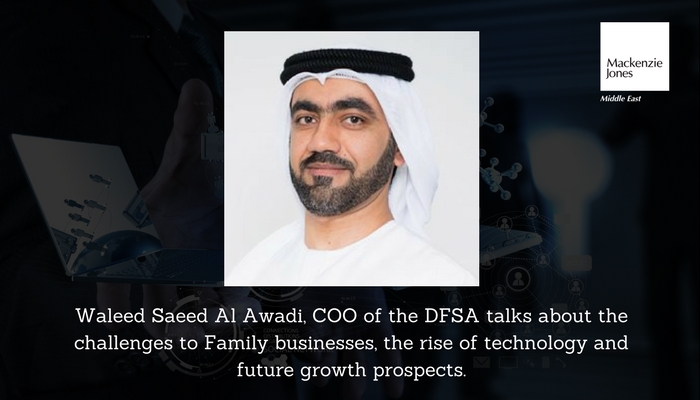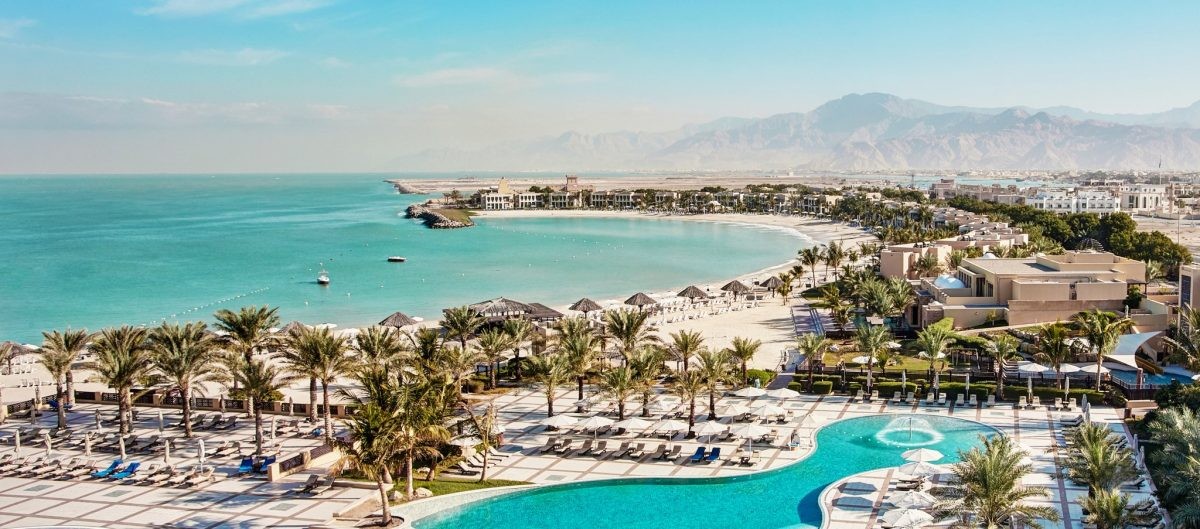
You recently published a book entitled ‘The Sustainability of Family Businesses in the United Arab Emirate – A Legal and Operational Perspective for Best Practice.’ What do you see as the biggest challenge to the sustainability of family groups in the UAE?
Family businesses in the UAE are the mainstay of the economy as they significantly contribute to the economic activities in the country. Family ties and interpersonal networks are considered a reliable source of capital since such relationships typically provide certain protections and guarantees and also because people do not trust anyone they do not know to manage their money. Family businesses in the UAE resonate well with the culture that is based on patriotism, religion, family and society.
The most critical challenge for family businesses in the UAE, in my opinion, involves succession planning, especially since many organisations are expected to transfer ownership to the next generation within a decade or so. In order to ensure continuity of the success of an organisation, it is essential for the passing of this role to be done in a proper and transparent manner. Universally, only a third of businesses survive the succession of the family business from first generation to the second generation of owner management. Amongst those family businesses who survive the first stage, it is only a third of them who will make it to third generation of ownership.
It is crucial for the succeeding generation to actively participate and get involved in the concerned family businesses in order to get insight on running and managing it. For efficient functionality of a succession plan, one of the key components is the support from the current leadership to create a mutual respect factor and environment. The following four components are in general important for a proper succession plan: The succession timing, the technique applied, successor skills and suitability and proper communication between the current leadership and the successor(s). Succession planning is a very sensitive issue and involves such dilemmas as: how to maintain neutrality when family feelings are involved. Many of the business founders leave the succession processes until the last minute, creating anxiety for families because heirs have to deal with legal hurdles that sometimes increase any transition challenges that family owned businesses face. This, in particular, is a challenge for family businesses in the UAE due to the Inheritance Laws, which dictates the distribution of inherited assets.
In a proper and successful transition, factors such as strong communication, formal education and ability to approach things in different and new ways are important. Dissimilarity in views and ideas relative to generations will always be a challenge facing the businesses but with proper efforts and commitment from the concerned generations, the transition process can be smoothed. The process becomes more rewarding and successful when the generations have the will to work jointly and put significant efforts to ensuring proper operations. Succession planning is the best way to guarantee the survival and continued success of a family business.
What legal and operational changes do you believe family groups should consider making, to best cope with the challenges in the current business economy?
Firstly, the creation of a family charter. Such a charter is usually the first stage in governance implementation, and is a major element in dealing with succession planning and corporate governance. This document should include explanations and definitions of the principles of the family in regards to its commitment to vision, mission and core standards of the business. This document provides a clear definition of all the roles, functions and makeup of the family governance establishments together with the governing bodies of the company for instance the board of directors and senior management. It should also include guidance for succession planning. A family charter establishes a moral commitment on members of the family to follow its principles as well as its real value of the family members’ readiness to be attached to it and bound by it. This step is an important one for family businesses in the UAE as it would take into account and formalise the approach to ensure sustainability of the business rather than allow family bias and favouritism to influence decisions that may not be the right one.
Secondly, in order to ensure proper and efficient support of family businesses in the UAE, an institution could be developed in the UAE that can be put in charge of entrepreneurial development. The new UAE institution can be tailored as a ministry or an agency and its role should be to lead the implementation of development and entrepreneurial strategies by taking charge of all the segments of the family businesses development strategy from the initial step of defining the goals to the ultimate implementation and subsequent monitoring of the progress. I think it is important that the UAE has a national entity supporting family businesses for example with preparing a family charter, corporate governance and succession planning. The aim of the entity could be to identify country-specific challenges and assist in solving these. Moreover, they may assist with keeping the corporate governance rules up to date, advising the government and increasing awareness for the need of sustainability and corporate governance.
Thirdly, mediation is to be used for resolving disputes as it leaves the solution in the hands of the concerned parties where the decisions are not made by a third party but rather are left for the parties to decide on what they want but with the aid of a mediator. I believe mediation offers a good forum for family businesses to repair any damaged relations which may have been dented due to internal conflicts for the disputing parties. Thus, wise families develop a number of ways to tackle complex conflicts and as part of this process appoint a third party who they trust as a mediator. Indeed, the best way to avoid these complex conflicts and also tackle them effectively if they occur is the knowledge that there is a proper mechanism in place for dispute resolution. The suggested national entity might also be able to assist in promoting mediation as a first step to resolving disputes in family businesses in the UAE.
What impact is technology having on the UAE economy and way of life?
Technology will disrupt the way of life in the UAE and will manifest itself by not only improving the financial architecture but also greatly enhancing the city’s infrastructure and standard of living. It offers the opportunity to develop innovative business models, optimise operational efficiencies, reduce costs for businesses and – most importantly – increase financial inclusion.
The use of technological innovations to improve the lives of the UAE population has been a commitment of the UAE government through the National Innovation Strategy to create an innovation-friendly ecosystem. Under the leadership of the Vice President and Prime Minister of the UAE and Ruler of Dubai, His Highness Sheikh Mohammed Bin Rashid Al Maktoum, the Dubai Plan 2021 really pushes this forward. As part of that, the Smart Dubai, the Dubai Future Foundation and the Dubai Blockchain Strategy all explore and evaluate the latest technology innovations to deliver safe, efficient, and impactful experiences in the city. Blockchain technology is already being piloted at government entities across the city while the Dubai Economy Council announced plans to launch the city’s own encrypted digital currency, emCash, based on blockchain technology.
SMEs are a significant contributor to the UAE economy. According to the UAE Ministry of Economy, they contribute 60% to the UAE GDP and employ 60-65% of the UAE workforce. Technology will play a critical role in the sustainable growth of this sector. For example, according to the Khalifa Fund, approximately 50-70% of SMEs have had their applications for funding from conventional banks rejected. Crowdfunding, a technological innovation, has the potential to disrupt traditional financing and fill a sizable gap in the market. The DFSA introduced new regulations for crowdfunding platforms last year.
What do you see as the impact of FinTech within the financial services sector? Do you anticipate seeing an increase of FinTech firms in the DIFC?
Creative destruction in the financial sector because of FinTech is inevitable. It will revolutionise and recalibrate the landscape of the financial services industry. Economies are becoming borderless and businesses that fail to reform and “digitalise” will be left behind.
Disruptive technology such as FinTech, RegTech and Blockchain, have been around for some time. And we have already seen the positive impact of these developments. Mobile banking has allowed financial services to get to hard to reach places, where the costs of opening and maintaining a physical bank branch can supersede the potential business opportunity. There are notable examples of how mobile banking has filled this gap across Africa, South East Asia and Latin America.
Technology also offers financial services providers with the ability to capture better data and analytics. Artificial intelligence is playing an increasing role in money management. According to some research, currently 1% of the US population — an influential 1% with more than $24 billion of spending power — are placing themselves safely and quietly behind intelligent agents.
The momentum behind FinTech has evolved as a consequence of the global financial crisis and subsequent regulation. This has meant that the cost of doing business in the traditional banking model has gone up. As a regulator, we recognise the importance of innovation and technology to support old and enable newer financial services business models and we have encouraged its development in our market. As part of our efforts to encourage this, we have added Innovation as a new strategic theme to the DFSA strategic priorities, which also aligns with the National Innovation Strategy.
In May last year, the Innovation Testing Licence (ITL). The ITL is a limited financial services licence for FinTech firms with the provision of full scope financial services authorisation.
We are also providing regulatory support to the FinTech Hive at DIFC which was launched in 2017 as the region’s first accelerator programme, in partnership with Accenture. Our goal is to allow those offering financial services a seamless transition from the Hive’s Accelerator programme into our ITL. We have seen in the FinTech Hive at DIFC, firms using technology to facilitate on one hand, cross-border payments, and on the other hand Bluetooth-enabled payments that don’t require Internet connectivity. Both of these have the potential to advance the financial inclusion agenda.
We continue to receive applications and interest from the market to authorise FinTech based business models in the DIFC. The variety of applications and business models in the authorisation pipeline confirms that this trend will continue and the new business models will persistently challenge our existing financial frameworks in an increasingly disruptive fashion.
Several sources in the press have referred to [quote] “FinTech is the new oil for the UAE” what are your thoughts?
There has been a lot of focus on the role of FinTech in the UAE, and the Middle East and North Africa region as a whole. And rightfully so, FinTech is of strategic importance for the region due in large part to the financial inclusion benefits and the opportunity it offers for economic diversification. The SME sector as I mentioned earlier, is a hugely important sector for the UAE economy and FinTech provides an alternative and important funding source to support the development of this sector.
According to a report by Accenture, of the USD 50 billion plus-worth of investment flows into FinTech since 2010, only 1% has gone to the MENA region. Taking a broader view, the countries comprising the Middle East, Africa and South Asia are among the fastest-growing markets in the world, the majority of which are Muslim, and 70% are unbanked. With 25% of the global Muslim population in the MENA region, it is clear that Islamic FinTech can inexpensively bridge this gap, boosting financial inclusion, a key enabler of poverty reduction and prosperity expansion, according to the World Bank. Therefore, the market is potentially lucrative.
There are now approximately 100 Islamic FinTech businesses across 24 countries carrying out activities in nine different areas, the main being crowdfunding (35%), banking software (18%) and payments, remittances and foreign exchange (14%).
The biggest markets for Islamic FinTech are Malaysia, UK, Indonesia and the UAE. The UAE and the DIFC specifically serves as the leading financial centre for the MENA region and the contribution it is making to the non-oil economy continues to grow. FinTech only helps to accelerate the ease at which this industry can grow through mobile and digital banking and improved use of artificial intelligence for trading, risk and asset management. The UAE and the DIFC strongly supports these Islamic Finance FinTechs.





